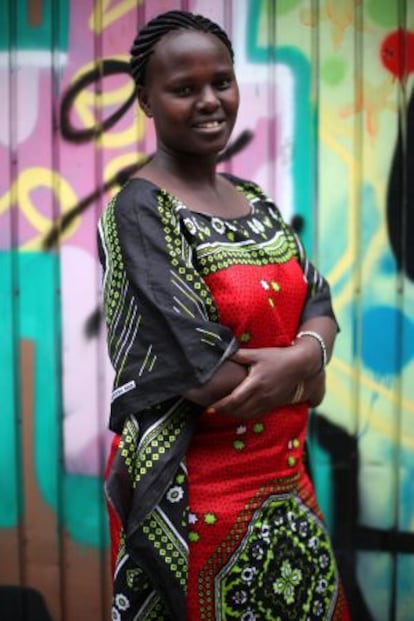“I ended up alone for refusing to be mutilated”
Janet Naningoi wants her experience to serve as an example to other girls

Janet Naningoi watches with the eyes of a little girl. Everything is new and exciting. Her wide smile turns into a face of astonishment. “Where have all these people come from?” she asks, dressed in her blue lkarasha, a kind of shawl, decorated with small coins that jangle together, that is typical of her home country, Kenya.
In her 23 years she has never seen the subway. “And can you breathe underground?” she asks. It is the first time Naningoi has left Marigat, one of the communities in Africa that still has a high incidence of female genital mutilation.
And that is precisely the thing that brings her to Madrid: Naningoi ran away from home when she was nine to avoid being circumcised and now wants to serve as an example to other women.
It was a teacher who first warned her about the terrible consequences of female genital mutilation, a practice that many still consider an initiation rite marking entrance into adulthood. “After performing the circumcision, our parents can marry us off or obtain a dowry,” she says.
If a girl is not circumcised before she is married, they believe that her husband will die, the midwife will go blind at the moment her child is born, or that the baby will suffer from some kind of abnormality.
“There are thousands of myths,” she says. “There are also those who say that the Bible or the Koran orders it, but it is not true.”
She ran away from home when she was nine to avoid being circumcised
Nobody knows for sure what the origins of this deep-rooted practice are, though it is clear that it continues to be performed — despite the risk of punishment in most countries — out of fear of rejection or marginalization.
“I ended up alone for refusing,” Naningoi recalls. Her big eyes mist up with tears. She finds it difficult to go on talking. “When I start to remember, I sometimes can’t bear it,” she explains.
Her friends told her she was a coward because she was afraid of the pain. Her parents didn’t understand what was wrong with her. But she didn’t give in. On the last day before the December school vacations she sought help at her aunt’s house because she knew this was one of the months chosen for the ritual mutilation and that she was in danger.
“There are various times when it is practiced: April, August and December,” she explains. “I was in hiding for those three months because I was afraid of my family.
I was in hiding for those three months because I was afraid of my family”
“The situation has improved a lot since then,” she ventures, breaking out into a broad grin. “At least now we can talk about it.”
She takes out her cellphone and shows a photo in which she appears giving a talk at a school. She is a volunteer for World Vision, the charity that helped her patch things up with her parents and has now brought her to Spain to contribute to the Stop Ablación (Stop female genital ablation) campaign. Her experience has served as an example to many young girls, among them her five younger sisters.
“I am studying for a teaching diploma so as to be able to educate many more youngsters, the same as they did with me,” she says.
This wasn’t her only option, however. “I also wanted to be a radio presenter because my words would be able to reach many people. In Kenya, most people don’t have a television,” she explains.
Would she like to live in another country? “For a while, yes. I want to come back to Madrid to study for a doctorate or a master’s degree, but I need a grant.”
Naningoi shrugs her shoulders and smiles with a touch of resignation. “Everything is so modern here... the people are so nice... and for the first time I saw snow,” she says. “I don’t feel homesick.”
Perhaps it’s best that her boyfriend doesn’t find out about that, though. Naningoi has already chosen the man — “if all goes well” — who will one day become her husband. The majority of girls her age back home are forced into arranged marriages.
“My dream is for the day to come when no little girl will have to experience the hell of female genital mutilation,” she says.







































